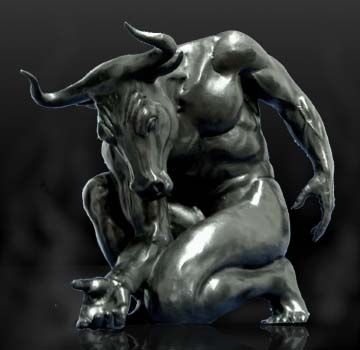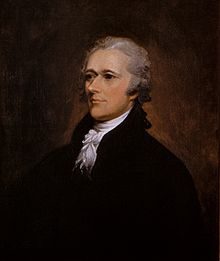When people talk about the ancient mythological creature Minotaur, a ferocious beast immediately comes to mind and perhaps the infamous myth of the labyrinth as well. What people may not know, though, are the interesting details of the events that lead up to the birth of the mighty Minotaur. What is universally recognized as a feared creature of unusual birth was actually created from unfortunate actions between a selfish king and a vengeful god.
King Minos and his wife Queen Pasiphae led a good life ruling over the island of Crete. Minos held power over multiple islands of Greece and was recognized for his success and power by many. In an attempt to prove his rightful claim as King of Crete, Minos had sworn to locate the best bull he could find among his cattle, one that would be very favorable to its intended receiver. Minos would then take this great bull and sacrifice it to Poseidon, god of the seas, as he did each year in order to secure his ownership of the throne. One year in particular, among King Minos’ herd, there birthed a magnificent bull, one that possessed a unique kind of beauty that King Minos had never seen before. Minos truly was in awe of this magnificent bull, so much so that he found himself captivated by its beauty, and he realized that this bull was something he did not want to give up to the promised Poseidon. In fact, Minos purposefully chose to overlook the magnificent bull when making his decision, and settled on a less attractive bull to sacrifice to Poseidon.1

Watching him and his deceitful actions very closely, Poseidon took notice of King Minos’ plan in sacrificing a lesser bull to keep the best for himself. This made Poseidon very angry, and he immediately began thinking about how to discipline Minos for his selfishness. Poseidon saw that Minos loved his wife Pasiphae immensely, and with this knowledge, constructed a plan that would leave Minos and Pasiphae in the presence of a monster. 2
Poseidon cast a curse upon Queen Pasiphae, one of love, which she could not escape. Her love was not for her husband; instead, she felt love for his magnificent bull. Pasiphae would be found swooning over the magnificent bull as if it were a handsome and powerful man ready to take her into his strong arms. Alas, she was so utterly infatuated with the magnificent bull that she constructed a plan to lure the bull towards her, and hopefully lay with her romantically.3
Queen Pasiphae instructed a craftsman of the island, Daedalus, and his son, Icarus, to build her a wooden structure that represented a near-perfect body form of a female bull. She insisted that the piece be built as realistically as possible and large enough for herself to comfortably fit inside without revealing that she was human. In spite of her odd orders, Daedalus and Icarus did what the Queen asked of them. As a finishing touch, Queen Pasiphae placed a large cow hide over the structure so that the magnificent bull would notice the structure and take it as a female looking to mate. The Queen rolled the structure out to the field where she would often see the magnificent bull grazing day after day. She strategically placed herself in the view of the magnificent bull, stepped inside the structure, and waited patiently for the bull’s approach.4

After grazing for a bit, the magnificent bull caught sight of what it thought was the beautiful female and approached it. Before long, the Queen’s plan worked, as the magnificent bull fastened itself upon her and together, engaged in sexual and intimate relations. As a result of this, Queen Pasiphae became pregnant with the baby of the bull and upon its birth realized she was carrying something horrific inside of her.5
Just as Poseidon intended, Pasiphae had relations with the bull she loved and later birthed an unusual creature, born half-bull, half-human to be known as the Minotaur.

The creation and birth of the Minotaur, as well as other monsters, typically is done in response to acts of sin. In this particular case, King Minos’ egotistical actions led him to break a promise made to a god, and in return, that god made Minos’ wife feel the same love that her husband did for the magnificent bull, giving in to her abnormal fascination and eventually birthing an infamous monster of ancient Greece.6
- UXL Encyclopedia of World Mythology, 2009, s.v. “Minotaur.” ↵
- UXL Encyclopedia of World Mythology, 2009, s.v. “Minotaur.” ↵
- Christian Moevs, “Centaurs, Spiders and Saints,” in Vertical Readings in Dante’s Comedy: Volume 2, edited by Corbett George and Webb Heather (Cambridge, UK: Open Book Publishers, 2016), 14-17. http://www.jstor.org/stable/j.ctt1sq5vb5.7. ↵
- UXL Encyclopedia of World Mythology, 2009, s.v. “Minotaur.” ↵
- Christian Moevs, “Centaurs, Spiders and Saints,” in Vertical Readings in Dante’s Comedy: Volume 2, edited by Corbett George and Webb Heather (Cambridge, UK: Open Book Publishers, 2016), 14-17. http://www.jstor.org/stable/j.ctt1sq5vb5.7. ↵
- George Palmer Garrett, “The Function of the Pasiphae Myth in Brother to Dragons,” Modern Language Notes 74, no. 4 (1959): 311-13. doi:10.2307/3040070. ↵



134 comments
Amelia Hew
Seriously, like all Greek mythology stories I’ve read they always punishes close relatives, family members or the victim instead of the person itself. True, because of King Minos’s greed he was punished by the god Poseidon but why drag his wife into this drama? I also felt sympathy for the queen, she was forced to take her husband’s punishment and had to give birth to a half bull half human child which later on was imprisoned in a labyrinth. But i guess this is what makes Greek mythology so interesting to read and the article provides great information regarding the mythology.
Roberto Rodriguez
Well… that story took an entirely different turn than I originally thought when I read the title of the article. I originally thought that King Minos was going to be turned into a horrible creature (the minotaur), because of his arrogance and his reluctance to follow what he had promised to Poseidon. Nonetheless that is a very interesting story that would have provided a valuable lesson for those that believed in the greek gods. The story kind of reminds me of the biblical story of Lot’s wife, who was warned by God not to look back at the destruction of Sodom and Gomorrah. She eventually looked back at the cities and was punished by God, who turned her into a pillar of salt.
Emmanuel Diaz
I don’t understand how some of the things in greek mythology go. It’s things like these that make you feel a bit sick to the extent of detail that was put into the story or was believed to be the story and brings me back to how hard it was for me to grasp and understand Greek mythology. This is despite remembering who was who and who did what to cause the trojan war. though it is easy to remember the big names of greek mythology, when digging deeper it gets confusing for me and will take more time for me to be able to hold in the information
Todd Brauckmiller
Reading this article reminded of one the classes I took in high school. We talked about Greek mythology for a semester and it was one of the best classes I took. The minotaur’s story is a strange one but when compared to the other mythology tales is blends in perfectly. When hearing this story it does make you feel bad for the queen who is suffering from the actions of her husband. Sadly the other stories are either as bad or worse than this one. Like for example when Odysseus left his home land and hadn’t return till his son was already a grown man, really sad. I did enjoy this article a lot and look into some of the others Greek myths they are very interesting.
Hali Garcia
From what knowledge I do have of Greek Mythology, I was always struck by what the Gods would do to the people who disobeyed or deceived them. The origin of the Minotaur is one of the stories that show the consequences of what could happen if someone angered the Gods. I was a little bit disturbed that Poseidon would make Pasiphae fall in love with the bull which would lead to the creation of the monster. Overall, I really enjoyed your article.
Tyler Reynolds
Well this was certainly a peculiar origin story for a monster. One could assume that it represents some individuals deeply represent perverted sexual desires. On the other hand, it could also represent how deviant, perverse, and selfish actions lead to pain, suffering, and chaos. Regardless of what interpretation you choose, it is clear that mingling with animals(zoophilia) is obviously an wrong and immoral action according to the people who recited the myth.
Michael Leary
A very interesting article. I never knew that there was such a complex and strange story behind the creation of a monster. I definitely did not know that it was half man and half bull because it had a human mother and a bull father. I found a bit ironic how poseidon saw the king’s love for the bull and made the queen love it in a more serious and different way.
Claudia Sanchez
Incredibly disturbing mythology. What bothers me the most about this is that his wife is punished the most for her husband’s actions. Sure he must be hurt that his wife did something horrible, but really she was the one who was cursed. Aside from the messed up nature of the story, this article was written really well and the story flowed. Greek mythology is a great and interesting topic that was handled well in this article.
Ryan Estes
I never knew how the Minotaur was conceived. The most interesting thing I found in this article is that even gods were prone to human emotions. Because of King Minos’ actions, Poseidon felt the need to exact revenge. You would think that gods would be above having human emotions, but this article is proof that they are just as prone to the same wide range of feelings as we are.
Ruby Wynn
I enjoyed reading this article. I have always been fascinated with Greek mythology, and have read about the Minotaur before, but I did not know about the queen requesting that Daedalus and Icarus build a fake bull for her to be inside. I also did not know that the creation of the Minotaur was a punishment from Poseidon on King Minos.